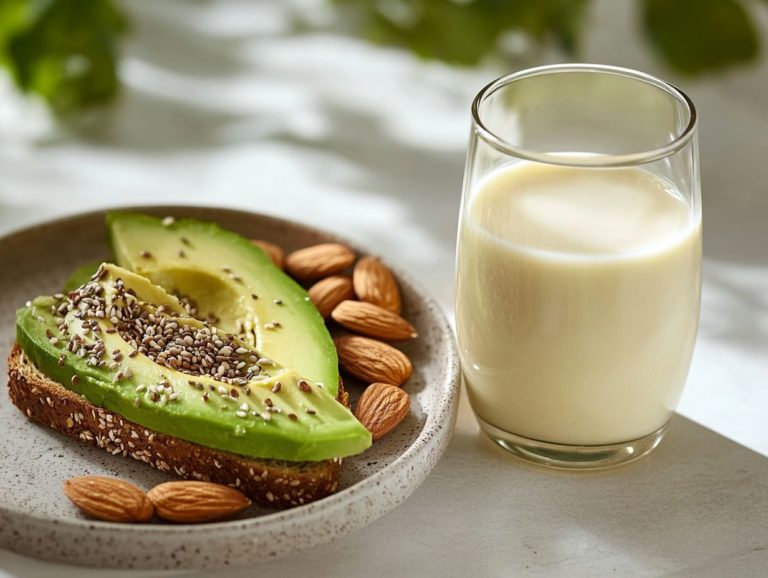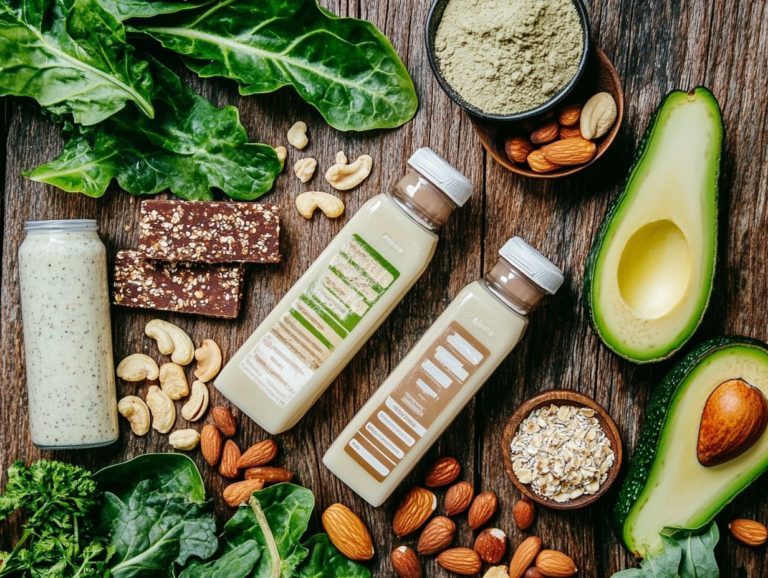How to Choose the Right Keto Protein Powder
Navigating the world of nutrition can indeed be a daunting task, especially when you re committed to a specific diet like keto. One crucial element that often slips under the radar is protein, which is vital for preserving muscle mass and supporting overall health.
Various protein powders are available to meet specific dietary needs, including keto-friendly protein options. Keto protein powder is a convenient supplement crafted to cater to your unique needs on a ketogenic diet.
This article delves into what keto protein powder is, the benefits it offers, and how to select the right type that aligns with your lifestyle, including plant-based protein options and the diverse protein powder types available.
Whether you re blending it into smoothies, incorporating it into your baking, or using it as a meal replacement with almond milk, grasping the potential of this powerful supplement can significantly enhance your keto journey.
Contents
- Key Takeaways:
- What Is Keto Protein Powder?
- Why Is Protein Important on a Keto Diet?
- Conclusion
- What Are the Benefits of Using Keto Protein Powder?
- What to Look for in a Keto Protein Powder?
- 1. Low in Carbohydrates
- Types of Keto Protein Powder
- How to Incorporate Keto Protein Powder into Your Diet?
- 3. In Baked Goods
- Potential Side Effects of Keto Protein Powder
- Frequently Asked Questions
- Conclusion
- Keto Protein Powder: Common Questions
Key Takeaways:

- Don t wait choose a keto protein powder low in carbohydrates to supercharge your diet today!
- Avoid artificial sweeteners such as Stevia and Monk Fruit, and additives in your keto protein powder to minimize potential side effects and maintain a clean eating approach.
- Incorporate keto protein powder into your diet through meal replacements, smoothies or shakes, and baked goods to add variety and boost your protein intake.
What Is Keto Protein Powder?
Keto protein powder is a specialized supplement crafted specifically to complement the ketogenic diet, which champions a low-carb, high-fat lifestyle to encourage ketosis and aid in weight management.
Unlike conventional protein powders, keto-friendly options are meticulously formulated to boost your protein intake while keeping carbohydrates to a minimum, making them perfect for anyone following a low-carb diet. Always check the ingredients list your health depends on it!
With a variety of protein powder types at your disposal including whey, casein, collagen, and plant-based sources like pea protein selecting the right keto protein powder can effectively support your athletic goals and foster muscle growth. These options can align perfectly with your dietary preferences.
You can find options from well-known brands like Transparent Labs.
Why Is Protein Important on a Keto Diet?
Incorporating sufficient protein into your keto diet is essential for several compelling reasons. It supports muscle growth, enhances satiety, and contributes to your overall health while adhering to a low-carb, high-fat nutritional plan.
Protein consumption is critical as it provides the necessary building blocks for various bodily functions. Protein is also vital for maintaining energy levels, particularly as you transition into ketosis the process where your body burns fat for fuel instead of carbohydrates.
A well-balanced intake of protein provides your body with the necessary building blocks for repair and recovery. This makes it critical for anyone aiming to lose weight or enhance their athletic performance on the ketogenic diet.
Studies from The American Journal of Clinical Nutrition and The Journal of Physiology support the importance of protein in such diets.
Conclusion
Choosing the right keto protein powder is crucial for maximizing the benefits of your ketogenic diet. By understanding the types of protein powder available and how they fit into your lifestyle, you can enhance your health and achieve your dietary goals. Make informed choices to support your keto journey!
What Are the Benefits of Using Keto Protein Powder?
Using keto protein powder brings a wealth of benefits, especially for those committed to a ketogenic diet. It supports your weight loss journey and promotes muscle growth.
It also delivers a convenient source of energy that aligns perfectly with your low-carb lifestyle. This is especially beneficial for those adhering to a high-fat diet to maintain ketosis.
These specialized protein powders are crafted to complement a high-fat, low-carb approach, ensuring that your protein intake remains optimal without throwing you off ketosis. By incorporating keto-friendly options into your meals or snacks, you can meet your nutritional needs while indulging in delicious flavors. This makes it easier for you to stay committed to your dietary goals. Various protein powder types, including grass-fed whey and casein protein, offer unique benefits for muscle recovery and growth.
The convenience of keto protein powder is truly remarkable; it enables you to whip up shakes in no time or seamlessly add supplements to your favorite recipes, fitting effortlessly into your busy life. This accessibility simplifies reaching your daily protein intake goals, which is crucial for preserving lean muscle mass during your weight loss efforts. Powdered forms of protein like collagen protein and pea protein are also versatile and easy to incorporate into various dishes.
Plus, many of these protein powders come packed with branched-chain amino acids (BCAAs), enhancing your recovery after workouts and ultimately aiding muscle growth. The Journal of Sports Science and Medicine highlights the benefits of BCAAs in muscle recovery.
By providing essential nutrients while adhering to a strict macronutrient balance, these protein powders become an invaluable ally for anyone navigating the challenges of a ketogenic lifestyle. The Journal of Nutrients has published studies supporting the efficacy of such supplements in low-carb diets.
What to Look for in a Keto Protein Powder?
When choosing a keto protein powder, it’s crucial to carefully check the ingredients list to ensure it aligns seamlessly with the core principles of a ketogenic diet, emphasizing low carbohydrates and high healthy fats. For instance, selecting protein powders with MCT oil and healthy fats like those found in avocados can enhance your dietary plan.
A premium keto protein powder should not only meet your specific dietary needs but also avoid artificial sweeteners like Stevia and additives that could undermine your weight loss goals and disrupt ketosis.
Focus on protein powders that provide a well-balanced macronutrient profile, and you’ll discover the ideal supplement to effortlessly enhance your low-carb lifestyle. This includes using protein powders made from high-quality sources like grass-fed whey, pea protein, or egg whites.
1. Low in Carbohydrates
When selecting a keto protein powder, one of the most critical factors to consider is its carbohydrate content; it should be low in carbohydrates to effectively support your ketogenic diet and promote ketosis. This ensures that your macronutrient intake aligns with the high-fat, low-carb approach necessary for maintaining energy levels while adhering to a reduced carbohydrate intake.
By choosing low-carb protein options, you can enjoy a guilt-free supplement that perfectly aligns with your dietary goals!
Maintaining this low carbohydrate content is essential, as it helps your body transition into and sustain the metabolic state known as ketosis, where fat becomes your primary source of energy instead of glucose. The Journal of Sports Science and Medicine provides insight into how low-carb protein options can aid athletes in muscle recovery and energy management.
As you search for the right protein powder, it’s vital to consider not just the carbohydrate counts but also the sources of protein, such as whey or plant-based options like soybeans, potatoes, or rice, which can provide additional health benefits.
Ultimately, finding a suitable keto protein powder can enhance the versatility of your meals, simplify post-workout recovery, and keep you on track with your overall objectives. It plays a key role in balancing your macronutrients while fueling your active lifestyle and meeting your athletic needs.
2. High in Fat

For a protein powder to truly align with your keto lifestyle, it should boast a high fat content that complements the principles of a ketogenic diet. Look for healthy fats such as MCT oil or grass-fed sources, as they can enhance the nutritional profile and provide essential energy without derailing your ketosis.
This is essential for you to optimize your dietary benefits while enjoying supplementation that harmonizes with your high fat intake. These ingredients help maintain a high-fat diet, which is crucial for ketosis.
High-fat protein powders not only sustain your energy levels but also promote a sense of fullness. This makes it easier for you to manage your appetite throughout the day. By incorporating fats from sources like avocados or nuts, you can significantly elevate the overall health benefits of your supplement, enhancing cardiovascular health and improving mental clarity.
The Journal of Nutrients provides evidence on the advantages of healthy fats in a keto regimen. These fats are loaded with essential fatty acids and antioxidants, contributing to your overall well-being.
They become an invaluable addition to your keto regimen, especially if you’re striving to lead a healthier lifestyle while staying true to your dietary goals. Powdered forms of protein like casein and collagen can also help maintain this balance.
3. Moderate in Protein
A well-balanced keto protein powder should feature a moderate amount of protein. This ensures that it meets your dietary needs without surpassing the daily protein limits set by the ketogenic diet.
This delicate balance is vital for supporting muscle growth while adhering to the specific macronutrient ratios that the diet demands. By selecting protein powder options that provide an effective yet moderate dose of protein, you can enhance your muscle-building efforts and overall nutrition.
Moderate protein content is crucial for sustaining your energy levels throughout the day, minimizing the risk of muscle breakdown during challenging phases of a ketogenic lifestyle.
It aligns perfectly with the recommended fat and carbohydrate ratios, allowing for a smooth integration of a high-fat diet while still promoting muscle recovery. Studies in The Journal of Physiology support these nutritional strategies.
Whether you opt for whey, casein, or plant-based sources, each offers unique benefits. This makes it easier to accommodate your dietary preferences.
These protein types promote proper amino acid intake, supporting not only muscle growth but also essential bodily functions especially important for those who engage in regular exercise. Supplement options like grass-fed whey can be particularly beneficial.
4. Free of Artificial Sweeteners and Additives
Choosing a keto protein powder that is free of artificial sweeteners and additives is crucial for your health and your weight loss journey. You want to avoid unnecessary chemicals that could throw your body out of ketosis.
Opting for transparent labels can help ensure you’re getting a clean product. These sneaky ingredients, often hidden under various aliases, can stir up digestive issues, amplify cravings, and disrupt your metabolism.
This ultimately complicates your efforts to reach and maintain a ketogenic state. By seeking out clean, natural choices, you should look for protein powders made from high-quality sources like grass-fed whey, pea protein, or egg whites.
Prioritizing products with straightforward, easy-to-read ingredient lists ensures that you re nourishing your body with effective, wholesome supplements. This thoughtful approach boosts your overall well-being and strengthens your commitment to a low-carb lifestyle.
Make the switch to a clean protein powder today to pave the way for more consistent fat burning and enhanced energy levels.
Types of Keto Protein Powder
Keto protein powder presents a diverse array of options, each with its own distinct advantages, accommodating various dietary preferences. This variety gives you the power to select the perfect match for your nutritional requirements.
Among the most prevalent types are whey protein, casein protein, collagen protein, and plant-based alternatives like pea protein. This extensive selection ensures that everyone from dedicated athletes to casual fitness enthusiasts can easily discover keto-friendly protein sources that align with their lifestyle.
By familiarizing yourself with these options, you can easily tailor your protein intake to supercharge your health goals!
1. Whey Protein
Whey protein stands out as one of the premier choices for keto protein powders, thanks to its high biological value and rapid absorption rate. It’s perfect for post-workout recovery and muscle growth, seamlessly supporting your protein consumption goals without pushing your carbohydrate intake into the danger zone crucial for maintaining ketosis. No wonder whey protein has become a staple for fitness enthusiasts and those dedicated to a ketogenic diet.
Whey protein promotes muscle repair after intense workouts. This helps you recover faster and return to your training more effectively. It fits effortlessly into a low-carb lifestyle, typically boasting minimal carbohydrates to keep your body in that coveted ketotic state.
The convenience of whey protein supplements available in an array of delicious flavors and forms makes it easy to incorporate into your daily routine. For anyone committed to their fitness and ketogenic objectives, this protein powder doesn t just meet your nutritional needs; it enhances your overall health and performance.
2. Collagen Protein
Collagen protein has emerged as a go-to choice for those seeking a keto-friendly protein powder, thanks to its impressive array of health benefits, including support for skin elasticity and joint health. Often sourced from grass-fed origins, this protein type boasts a unique amino acid profile that aligns perfectly with the needs of individuals on a ketogenic diet while enhancing overall wellbeing. By weaving collagen protein into your daily regimen, you can relish both the benefits of protein consumption and the added perks for your skin and joints.
Beyond its essential role in building and repairing tissues, collagen protein can significantly boost skin hydration and reduce wrinkles, helping you achieve that youthful glow many aspire to have. For those committed to a low-carb lifestyle, such as the ketogenic diet, collagen protein serves as an excellent alternative to traditional whey or casein, ensuring your nutritional goals are in harmony with your health aspirations.
It also plays a crucial role in supporting joint recovery and mobility, making it especially appealing for fitness enthusiasts or anyone dealing with joint discomfort. Integrating collagen protein into your daily routine not only optimizes muscle recovery but also fosters healthier skin and stronger joints, amplifying the benefits of your keto lifestyle.
Conclusion
In summary, each type of keto protein powder offers unique benefits that cater to diverse health goals. Whether you choose whey protein for muscle recovery, collagen protein for enhanced skin and joint health, or plant-based alternatives for variety, there’s an option that aligns with your nutritional needs. Explore these options to find the perfect protein source that suits your ketogenic journey!
3. Plant-based Protein

Plant-based protein options, like pea protein, have become excellent keto protein powders for anyone seeking vegan or vegetarian alternatives while following a ketogenic diet. These sources deliver clean protein without animal products, catering to a wide array of dietary preferences and maintaining those all-important low-carb requirements. By opting for plant-based protein, you can enjoy the advantages of protein consumption without sacrificing your ethical or dietary values.
What s more, these plant-based protein powders are often easily digestible and are typically loaded with essential nutrients that support overall health. Pea protein, in particular, stands out for its richness in branched-chain amino acids (essential nutrients for muscle growth), which are crucial for muscle growth and recovery making it a fantastic choice for fitness enthusiasts on their ketogenic journey.
Many of these plant-derived proteins are lower in allergens, making them suitable for those who may have sensitivities to dairy or gluten-based options. This blend of health benefits and ethical considerations transforms plant-based protein from merely a choice into a savvy alternative for anyone navigating the complexities of modern nutrition.
How to Incorporate Keto Protein Powder into Your Diet?
Incorporating keto protein powder into your diet is a straightforward yet delightful endeavor, serving as a versatile enhancement for meals or snacks.
By using this supplement as a meal replacement, blending it into smoothies or shakes, or even infusing it into your baked goods, you can effortlessly meet your nutritional objectives without compromising on taste.
Whether you’re seeking a quick grab-and-go solution or a creative twist for your beloved recipes, keto protein powder can seamlessly integrate into your ketogenic lifestyle.
1. As a Meal Replacement
Using keto protein powder as a meal replacement is a savvy strategy for anyone aiming to maintain a low-carb diet while still ensuring sufficient nutrition on-the-go. This approach lets you enjoy balanced macronutrients without the hassle of preparing full meals, making it a perfect fit for your busy lifestyle.
By combining keto protein powder with low-carb ingredients, you can whip up satisfying and nutritious meal replacement options that keep you in ketosis. With just a few simple additions like unsweetened almond milk, a handful of spinach, and a tablespoon of nut butter you can create a delicious smoothie that delivers a protein punch while keeping those carbs in check.
If you re feeling like something more substantial, consider folding the protein powder into baked goods. Keto-friendly muffins or pancakes made with almond flour or coconut flour not only enhance the flavor but also add healthy fats and fiber to your meal.
Always aim for a harmonious balance of protein, healthy fats, and fiber to keep hunger at bay and maintain your energy levels throughout the day.
2. In Smoothies or Shakes
Incorporating keto protein powder into your smoothies or shakes is an exceptional way to elevate your beverage’s nutrition while keeping those carb counts in check. By blending protein powder with keto-friendly options like almond milk or healthy fats such as MCT oil, you can craft delicious and satisfying drinks that seamlessly align with your dietary aspirations.
These nutritious shakes not only offer a quick protein boost but also help you stay full and energized throughout the day. This approach opens up a world of flavor combinations, making it effortless to adhere to your low-carb lifestyle.
Imagine blending keto protein powder with unsweetened cocoa powder, spinach, and coconut milk for a decadent chocolate green smoothie. Or how about a refreshing berry-infused shake that combines keto protein powder with frozen raspberries, yogurt, and a splash of unsweetened almond milk?
To truly maximize the nutritional benefits, consider adding ingredients like chia seeds or avocado, both of which provide healthy fats and fiber. Experimenting with various flavor profiles and textures allows you to meet your dietary needs while indulging your taste buds.
3. In Baked Goods
Using keto protein powder in your baked goods opens up a world of delicious low-carb snacks that satisfy your cravings while supporting your dietary goals. By swapping out traditional flour for keto protein powder in your recipes, you can maintain the delightful texture and flavor of your favorite treats. This approach not only boosts the protein content of your snacks but also gives you the chance to experiment with new, healthy recipes.
To truly make the most of keto protein powder, consider incorporating it into popular baked goods like muffins, pancakes, and cookies. Start by replacing a portion of the flour in your recipes with the protein powder typically about one-third to one-half while adjusting the moisture content with ingredients like almond milk or coconut oil. For an extra burst of flavor, toss in some unsweetened cocoa powder or sugar-free chocolate chips.
Don t hesitate to explore different flavors of protein powder vanilla, chocolate, or even peanut butter to elevate your creations. These low-carb options not only satisfy your cravings but also fit seamlessly into a healthy eating lifestyle.
Potential Side Effects of Keto Protein Powder
While keto protein powder can provide a range of benefits, it’s essential to weigh the potential side effects that may arise, especially for those with digestive issues or specific health concerns. You might discover that your body reacts negatively to certain ingredients typically found in protein powders, such as artificial sweeteners like Stevia or Monk Fruit, or excessive protein intake, which can result in bloating, gas, or discomfort.
By being mindful of these potential side effects, you can make informed choices when selecting and integrating keto protein powder into your dietary routine. Look for high-quality options like Grass-Fed or brands such as Transparent Labs to help maintain Ketosis.
Frequently Asked Questions

What is a keto protein powder and why is it important?
A keto protein powder is a supplement designed specifically for those following a ketogenic diet. It contains high amounts of protein and low amounts of carbs and sugar, making it a suitable option for those looking to maintain ketosis. This is important because it can help support muscle growth, improve energy levels, and assist in weight loss.
What should I look for in a keto protein powder?
When choosing a keto protein powder, it’s crucial to look for a product that is low in carbs and sugar, high in protein, and free from artificial ingredients. It should also contain healthy fats, such as MCT Oil, to support a ketogenic diet. Check for certifications and third-party testing to ensure the product’s quality and purity.
Are whey and plant-based keto protein powders equally effective?
Both whey and plant-based keto protein powders can be effective, but it ultimately depends on your individual needs and preferences. Whey Protein is a complete protein source, meaning it contains all essential amino acids, making it ideal for muscle growth and repair. Plant-based protein powders, such as Pea Protein or Rice, are suitable for those with dietary restrictions or allergies to dairy.
Both whey and plant-based keto protein powders can be effective depending on your individual needs and preferences. If you’re considering dietary restrictions or have allergies to dairy, plant-based options like pea or hemp protein can be a great choice.
Conclusion
Incorporating keto protein powder into your diet can open up exciting new possibilities for low-carb baking and snacking. Not only do these delicious recipes support your ketogenic goals, but they also allow for creativity in the kitchen. Try blending different flavors for a delightful surprise and remember to stay mindful of potential side effects as you embark on your keto journey!
Keto Protein Powder: Common Questions
Should I choose a flavored or unflavored keto protein powder?
This choice depends on personal preference. However, flavored keto protein powders may have added sugars and artificial ingredients.
If you want to limit your sugar intake, consider an unflavored option. You can add natural flavors like cocoa powder, fruit, or Almond Milk to your shakes.
Can I use a keto protein powder as a meal replacement?
Keto protein powders can serve as meal replacements. Just ensure they provide a balance of protein, healthy fats, and important nutrients.
Options like Casein Protein or Collagen Protein can help support your health and energy levels.
What are some potential side effects of using a keto protein powder?
Some people may experience digestive discomfort, like bloating or gas. If this happens, start with a smaller serving size.
Increase the serving gradually as your body adjusts. Staying hydrated and eating enough fiber are crucial for proper digestion, so include fiber-rich foods like Soybeans or Potatoes.






